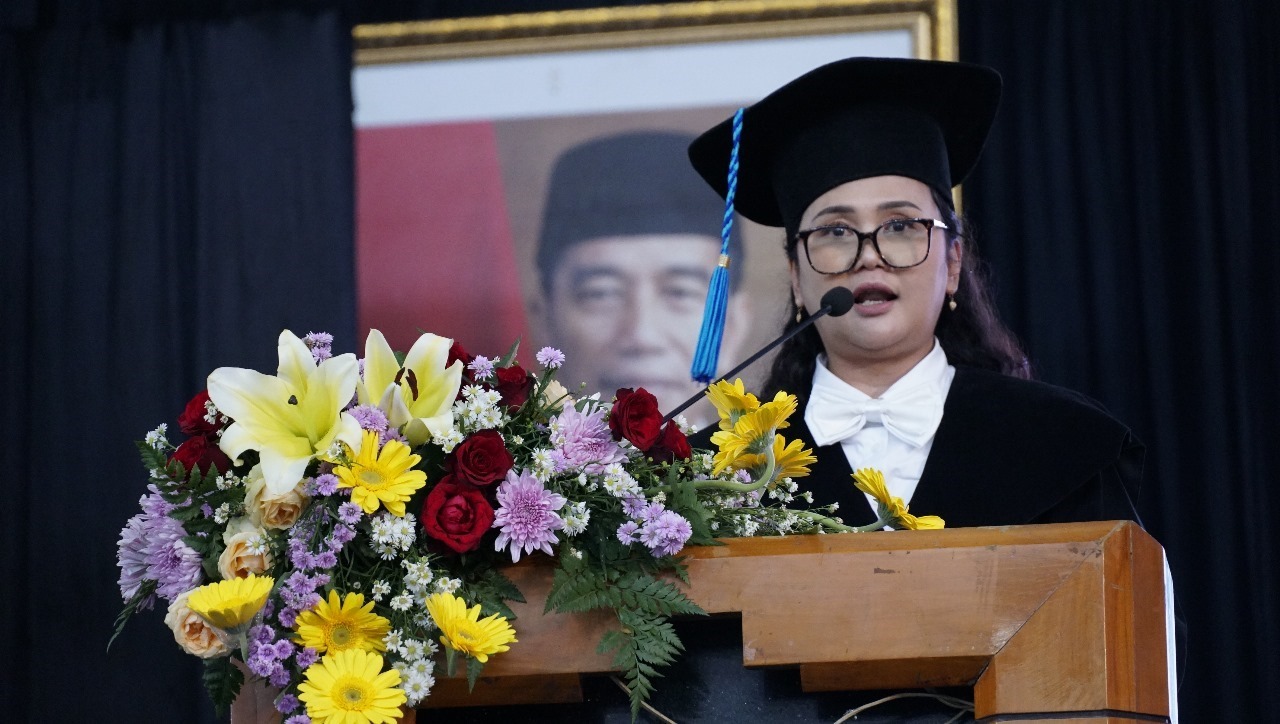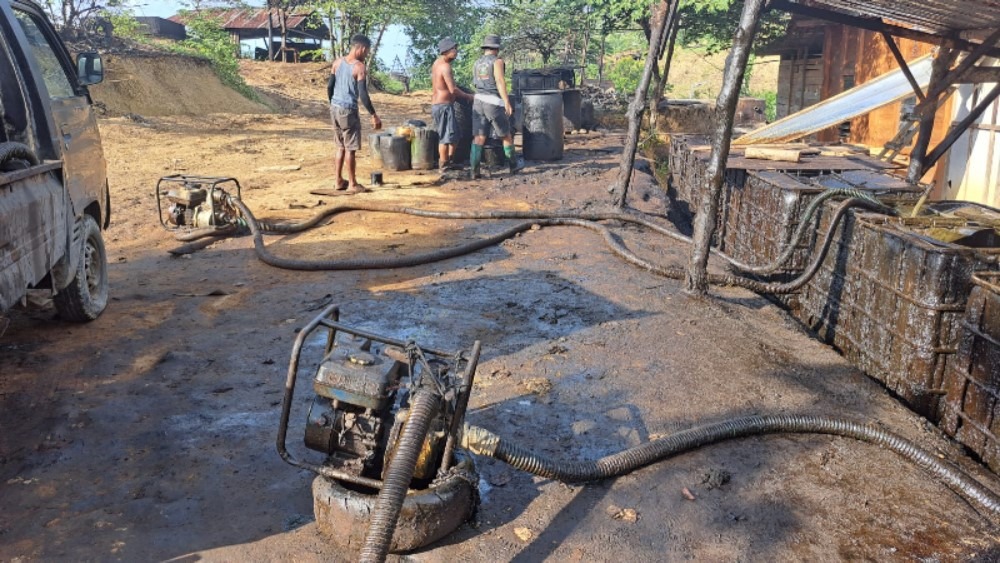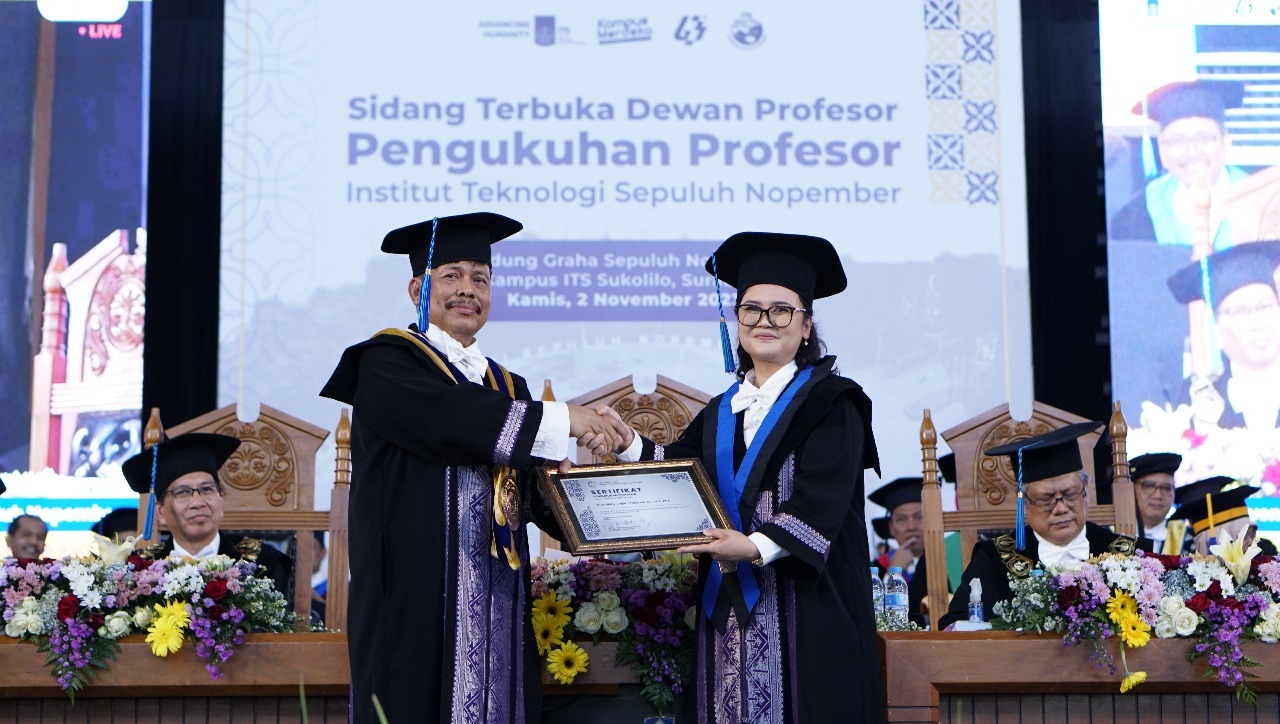ITS Professor Addresses Soil Pollution Through Remediation Technology

Prof Bieby Voijant Tangahu ST MT PhD delivering her inaugural lecture on remediation technology for the recovery of contaminated soil during her appointment as the 195th Professor at Institut Teknologi Sepuluh Nopember (ITS).
ITS Campus, ITS News –The surge in mining industry activities poses environmental pollution risks. In addressing this issue, the 195th Professor of Institut Teknologi Sepuluh Nopember (ITS), Prof. Bieby Voijant Tangahu ST MT PhD, has developed environmental remediation technology to restore soil contaminated due to mining activities.
The professor from the Department of Environmental Engineering explained that her research originated from environmental pollution caused by illegal oil mining in Wonocolo, Bojonegoro. Due to these mining activities, according to Bieby, the soil around the mining area is contaminated with crude oil, petroleum hydrocarbon compounds, as well as Benzene, Toluene, Ethylbenzene, and Xylene (BTEX) compounds.
Furthermore, Prof Bieby elaborated that these compounds are hazardous and toxic waste (B3) that can adversely affect the health of the local community. “Therefore, remediation technology is necessary to restore the land to its original condition,” she emphasized.

The contaminated soil condition due to illegal mining activities in Wonocolo, Bojonegoro, which has earned the nickname “Little Texas.”
In her research for her inaugural professorial lecture, Bieby utilized a biologically based remediation method combined with a physicochemical method. The physicochemical method involves the use of soil washing processing, aimed at separating the soil from crude oil and petroleum hydrocarbons. Meanwhile, the biological method functions to reduce the concentration of chemicals such as BTEX, nitrogen, cadmium, and mercury.
Bieby explained that the soil washing method is effective in reducing the oil content in the soil from 4 percent to less than 1 percent. Furthermore, the biological remediation method using the bacteria Bacillus cereus, Nitrosomonas communis, and Pseudomonas aeruginosa has shown a chemical concentration reduction ranging from 40 percent to 70 percent.
The selection of the biological method was made because the land in Indonesia already contains bacteria capable of naturally restoring pollution. Bieby revealed that with this research, it is expected to expedite the recovery process. “Moreover, biological methods tend to be more cost-effective and do not produce chemical waste,” stated the professor.

Chairman of the ITS Professor Council, Prof Dr Imam Robandi MT (left), presenting the certificate of appointment as the 195th Professor at ITS to Prof. Bieby Voijant Tangahu ST MT PhD.
Although this research is still at the laboratory scale, Bieby revealed that environmental recovery using the biological method has shown high efficiency. “In the future, this research will be mass-produced for direct application in various polluted areas,” said the lecturer who has been actively teaching since 1997.
Through this research, Prof Bieby aims to continue developing environmental remediation technology by harnessing bacteria to assist in restoring pollution caused by mining activities. “I hope that with the advancement of this knowledge, it can contribute to improving environmental quality,” she concluded optimistically. (ITS Public Relations)
Reporter: Regy Zaid Zakaria
Translator: Marcellius Fernando R
Related News
-
ITS Sends Off 12 Free Mudik Vehicles Ahead of Eid Al-Fitr
The dispatch of 11 bus fleets carrying ITS students for the Free Mudik ITS 2024 ITS Campus, ITS News
January 21, 2024 23:01 -
ITS Lecturer Wins 2024 Female Science Talents Intensive Tracks from Germany
Sri Fatmawati SSi MSc PhD, a lecturer at the Department of Chemistry, ITS, has emerged as the winner of
January 21, 2024 23:01 -
ITS Shares Tips & Tricks on SNBT 2024 Socialization
(from left) Executive Secretary of SNPMB 2024, Bekti Cahyo Hidayanto SSi MKom, Head of the Admissions Subdirectorate at ITS,
January 21, 2024 23:01 -
Supporting Defense in Indonesia, ITS Professor Creates Anti-Radar Material
Professor Dr. Mashuri SSi MSi, while delivering his academic oration on anti-radar materials during the ITS Professorial Inauguration. ITS
January 21, 2024 23:01
